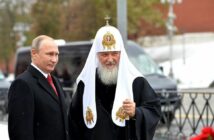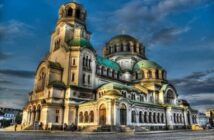Source: Public Orthodoxy
Very Rev. Dr. Andrei Kordochkin
Priest at St. Mary Magdalene Russian Orthodox Church (Madrid, Spain)
Editor’s Note: The Orthodox Church in Russia is divided, but this division is not canonical nor administrative. Moreover, it is not always visible from the outside. While the official Church has become an integral part of Putin’s political regime, on a deeper level, there is resistance on behalf of small Orthodox communities and individuals who deny accepting the proclamation of violence and the justification of war. These “propaganda sermons” are constantly pronounced from the ambos of the churches nationwide, causing abruption and difficult questions regarding why the Church in Russia rejects the Gospel. This “muted Christian resistance” is in search of like-minded people. It often addresses those Russians outside Russia who have openly declared their anti-war position. These priests can be addressed through social media and messengers. Below, we offer the reply of Archpriest Andrey Kordochkin to one of such numerous letters. – Sergei Chapnin
Dear N,
First, thank you for your trust and kindness towards me, a priest personally unknown to you.
You are asking me: what to do? Should you come to the Church and receive the sacraments? Is Christ present in the sacraments of Eucharist and Confession in the Russian Orthodox Church, and in that Church in general? How will the Russian Orthodox Church redeem the sin against the beatitude “Blessed are the peacemakers, for they will be called the children of God”? How can one not lose his mind from despair, inability to change anything, and pain?
Judging by the letters I receive from Russia, many people are confronted by these questions in one form or another, not excluding the clergy. What do the words “Let us love one another, that in one mind we may confess” mean when there is neither love nor one-mindedness? How can we all commune from one chalice? How does one confess to a priest, with whom there is no agreement on the issue, which is most important for today? What is the point of attending the Church if none of this is possible? It is most difficult for those who are left to answer these questions by themselves.
People go through something far more profound than disappointment in the Moscow Patriarchate as a jurisdiction. It is not even something to do with Orthodoxy or Christianity as such. I often think that what is going on today may be compared to the destruction of the Jerusalem Temple. It was not just the building that was destroyed, but also the human concepts of what “religion” is about. Nevertheless, if this had not happened, the words of Christ about worshipping God in spirit and truth could not have been fulfilled.
My personal discovery was something that may seem obvious: everything that we love in the Church and often call the Church—worship, sacraments, chant, iconography, theological treasures—all this does not save either an individual or a Christian community from a cataclysm. All the supporting pillars are collapsing, as are the links between the people, including the spiritual advisors.
In this disintegration and freefalling, the most important, or at least the first, question of the ones you are asking, is how not to lose one’s mind. We are speaking, of course, not simply about a mental illness but about the destruction and disintegration of a personality. This is what is happening to many people, including those who are close to us. This is something that is the most painful thing to watch.
People in Russia are subjected to the powerful forms of gaslighting, which denies reality. I go the Russian media resources, and I read a permanent disclaimer under the title “military operation in Ukraine”: “The Russian military leadership has assured that the civil population of Ukraine is under no threat, the purpose is to bring out of order the military infrastructure of Ukraine.” What is this supposed to mean, “under no threat”? Does it mean that there has not been a single civilian casualty? Does it mean that almost six million people have fled, with no reason, by stupidity? Does it mean that they could carry on living in Bakhmut or Mariupol as before? Everyone knows this is a lie, but those who publicly refuse to believe it are fined or imprisoned for “fakes” or “discrimination.” They are accused of extremism and terrorism by those who build their authority on internal and external terror. The latter make accusations of attack while attacking themselves. They pretend they struggle against fascism while creating a fascist dictatorship. They speak about “Russophobia” while depriving the Russian people of all the fundamental rights: freedom of speech, gathering, and free usage of the Russian language. The words “war,” “invasion,” and “attack” may not be used to describe the current events. They have deprived the Russian people of all rights except the right to die. It is easy to define their crimes: they are always guilty of what they accuse the others. They are incapable of dialogue, they are possessed by a deaf and dumb spirit, and they communicate with those who are not like themselves only through denunciations and repressions.
The stream of this psychic radiation is so powerful that it does not take much to lose one’s mind. Therefore, in your position, I think it is essential to find yourself in a circle, however small, of like-minded people. N. is a big city, and there are bound to be some people like that, including in the Church. Unfortunately, I cannot give you some concrete advice, but I hardly believe that no one is not blinded among the clergy.
If this is the case, the opposite is also true. Try to limit yourself in communication with those who are not like-minded, especially the clergy, especially during confession. Otherwise, you will cause significant damage to yourself. There is a patristic consensus on the subject. Basil the Great writes that confession should be made “to those who are like-minded and have given proof of both faith and understanding.” Abba Poemen said: “Do not lay open your conscience to anyone you do not trust in your heart.” This expression is similar to that of Mark the Monk: advising Nicholas the Solitary to reveal his thoughts to others, he says, “He should question other servants of God who are of the same mind and engaged in the same ascetic struggle, so that he does not travel in the dark without a light, not knowing how or where to walk.” John of Gaza says, “You should ask the person whom you trust, knowing that he must bear your thoughts; trust in him as if in God.”
Obviously, you may find tribulations in the context of the Russian tradition of compulsory confession before communion. However, you may find a like-minded priest you visit even once a year. If you treat the matter seriously, you will benefit from it much more than from a weekly two-minute confession. You could define the frequency of receiving the Holy Mysteries with the same priest.
As far as the “validity” of the sacraments is concerned, there are no reasons to doubt it. Remember the example of Judas: “And after the morsel, Satan entered into him,” says the Gospel. But why did this happen? Clearly not because the Last Supper was not “valid.” It is precisely its reality that has the capacity to transfigure but also to crush those who, imitating a kiss, care, and love, indeed carry forward with them death and destruction.
Despite the fact that the sacraments continue to be valid in churches where z-worship is preached, the answer to the question of whether it is possible or necessary to go to them does not seem obvious to me. We do not come to the liturgy in church in order to stand through the service with strangers, and at the end to receive communion, if the priest at confession considered us worthy.
Communion is not an individual act of piety. Liturgy is the sacrament of unity. “Unite us all to one another who become partakers of the one bread and the cup in the communion of the one Holy Spirit,” we pray at the Liturgy of St. Basil the Great. Are you happy to unite with people who confess z-worship? Are you ready to imitate a unity with them that does not exist? Everyone can make their own decision, but if the answer to these questions is negative, you are free to refrain from participating in services in z-parishes.
If we speak about the responsibility of the Church, it has to be understood in deeply personal terms. You are the Church in the same way as a priest, bishop, or patriarch. The Church for the Christians is always “us” and not “them.” Nonetheless, the collapse of the present political regime will not pass unnoticed for the Church. The present disappointment of so many people with how quickly the Russian Orthodox Church has substituted the message of repentance with a message of national superiority and exclusivism, how quickly adopted z-worshiping and z-veneration, accepting the cult of forceful domination, about which the Grand Inquisitor speaks to Christ in Dostoevsky’s novel, is only an echo of what we will have to live through. But there is the providence of God in this. It looks like there is no other way to purification and renewal.
All the feelings that you are going through—bitterness, hopelessness, powerlessness—in your situation are normal and natural. God prohibits you from feeling guilty about them. Try to find tasks that demand full attention and concentration. Try to spend more time in the countryside, in a world that is real, not imaginary. Books, art, travel—try to make your life as authentic as possible, not defined by the official agenda. The priority remains the same—to preserve yourself. “What good will it be for someone to gain the whole world yet forfeit their soul? Or what can anyone give in exchange for their soul?”
The dictatorship, which seems unshakable, has entered the mode of self-destruction. It has turned off itself from reality, and its collision with reality and disintegration is a matter of time. Indeed, after clouds come sunshine, and we will see better days.
With blessings and best wishes,
Archpriest Andrey Kordochkin
ABOUT AUTHOR
Public Orthodoxy seeks to promote conversation by providing a forum for diverse perspectives on contemporary issues related to Orthodox Christianity. The positions expressed in this essay are solely the author’s and do not necessarily represent the views of the editors or the Orthodox Christian Studies Center.





